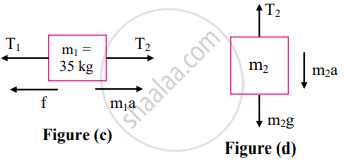Advertisements
Advertisements
प्रश्न
Solve the following problem.
The figure below shows a block of mass 35 kg resting on a table. The table is so rough that it offers a self-adjusting resistive force 10% of the weight of the block for its sliding motion along with the table. A 20 kg wt load is attached to the block and is passed over a pulley to hang freely on the left side. On the right side, there is a 2 kg wt pan attached to the block and hung freely. Weights of 1 kg wt each, can be added to the pan. Minimum how many and maximum how many such weights can be added into the pan so that the block does not slide along the table?

उत्तर
Frictional (resistive) force f = 10% (weight)
`= 10/100 xx 35 xx 10 = 35`N

1. Consider FBD for 20 kg-wt loads. Initially, the block kept on the table is moving towards the left, because of the movement of the block of mass 20 kg in a downward direction
Thus, for a block of mass 20 kg,
ma = mg - T1 .....(1)
Consider the forces acting on the block of mass 35 kg in a horizontal direction only as shown in figure (b). Thus, the force equation for this block is,
m1a = T1 - T2 - f .....(2)
To prevent the block from sliding across the table,
m1a = ma = 0
∴ T1 = mg = 200N ......[From (1)]
T1 = T2 + f ......[From (2)]
∴ T2 + f = 200
∴ T2 = 200 - 35 = 165 N
Thus, the total force acting on the block from the right-hand side should be 165 N.
∴ Total mass = 16.5 kg
∴ Minimum weight to be added
= 16.5 - 2 = 14.5 kg
≈ 15 weights of 1 kg each
2. Now, considering motion of the block towards right, the force equations for the masses in the pan and the block of mass 35 kg can be determined from FBD shown

From figure (c)
m1a = T2 - T1 - f .....(iii)
From figure (d),
m2a = m2g - T2 ....(iv)
To prevent the block of mass 35 kg from sliding across the table,
m1a = m2a = 0
∴ From equations (iii) and (iv),
T2 = T1 + f
T2 = m2g
∴ m2g = 200 + 35 = 235 N
∴ The maximum mass required to stop the sliding
= 23.5 – 2 = 21.5 kg ≈ 21 weights of 1 kg each
APPEARS IN
संबंधित प्रश्न
Answer the following question.
State the law of conservation of linear momentum. It is a consequence of which law? Give an example from our daily life for the conservation of momentum. Does it hold good during the burst of a cracker?
Solve the following problem.
A lighter object A and a heavier object B are initially at rest. Both are imparted with the same linear momentum. Which will start with greater kinetic energy: A or B or both will start with the same energy?
Ten identical masses (m each) are connected one below the other with 10 strings. Holding the topmost string, the system is accelerated upwards with acceleration g/2. What is the tension in the 6th string from the top (Topmost string being the first string)?
A bullet of mass m moving with velocity v is fired into a wooden block of mass M, If the bullet remains embedded in the block, the final velocity of the system is ____________.
Two masses M1 and M2 are accelerated uniformly on frictionless surface as shown in the figure. The ratio of the tensions `"T"_1/"T"_2` is ______.

If bullet of mass 'm1' is fired from a gun of mass 'm2' with a speed of 'V1', then the recoil velocity of gun is ______.
A body of mass 'M' moving with velocity 'V' explodes into two equal parts. If one part comes to rest and the other part moves with velocity 'v0'. What would be the value of 'v0'?
The motion of a rocket in upward direction with high speed is based on the principle of conservation of ______.
